It’s okay to embrace new traditions (even if you miss the old)
Reflections on the dualities of grief
Our first Thanksgiving together, we were a couple of kids, barely out of college. We lacked any of the skills necessary to host such a feast, but were fueled by the confidence of youth’s naivety.
The meal consisted of a prep-free turkey in a bag, overly mashed potatoes, and cranberry sauce from a can. We ate well into the night — 6 hours later than planned.
We were a band of misfits: Brad and I — not yet married; a couple of siblings and their new significant others; my future father-in-law, who soaked his tired feet in our brand-new and still-unused turkey pan; and one adorable, misbehaved dog, who stole bits of our meal whenever we weren’t looking.
Crammed into our one-room, 500-square-foot studio, we ate on the floor around our hand-me-down coffee table.

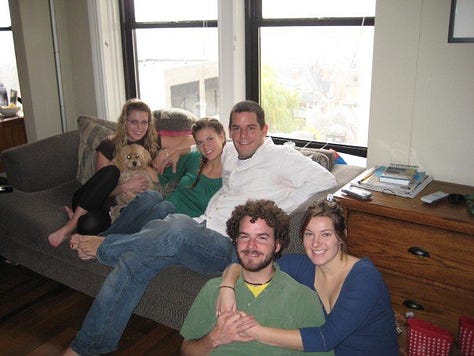
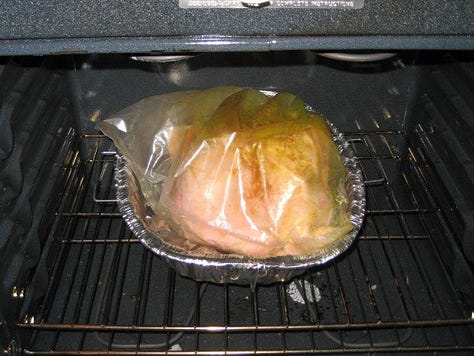
Despite the disastrous meal, a tradition was born. For the next decade, Thanksgiving would be ours to host.
Over time, we perfected roasting a turkey (no bag required). We grew up and grew into a loft with an actual dining table. We got married and traded mismatched plates for a complete dinnerware set.
Each year looked wildly different. One year, when the Michigan weather was unseasonably warm, we hosted an intimate backyard gathering with friends. Another year, we filled our loft with pop-up tables and fancy tablecloths, hosting 20 family members from across the country. Our fifth year hosting, after my cancer diagnosis, we held a raucous family gathering, where we celebrated simply being alive.
As life ebbed and flowed, so did our guest list, but one tradition remained constant: we would host the day.
Our tenth year was the last Thanksgiving we hosted together. Six weeks earlier, Brad had been diagnosed with a rare and aggressive cancer, threatening not just the traditions we’d created, but his life too.
I juggled hostess duties with caregiver responsibilities, alternating between prepping the food and Brad’s medications. Our blended family came from all corners of the country — divorced parents, in-laws, siblings — all brought together by the unspoken threat of mortality.
At the end of the week, everyone packed their bags, and I packed ours for the hospital. We learned what we already suspected: Brad’s cancer was growing.
Eight weeks later, Brad died at home, the place where we had lived out so many beautiful traditions.
After that, joy felt forced, and the holidays added a new level of pain. I had no desire to participate – all those holly, jolly people were too much for my grieving heart. The empty seat, a constant reminder of all I had lost.
In spite of my grief, I tried to embrace new traditions.
That first year, I joined Brad’s family in Florida, where they graciously allowed me to cook the turkey. I lit the oven on fire and almost burned down the house.
The next year, my dad was diagnosed with his own cancer. We drowned out our pain with Christmas carols and too much wine.
The year after that, I headed to my sister’s in Detroit, where I tended to my grief with an ax and a pile of wood.
Each year, a game of family pinball, bouncing between homes, wondering where I would end up next.
Joy tried to creep in but was often pushed back out by guilt.
By year four, there was a shift. I missed the music, the warmth, the laughter. I missed the traditions. I missed my traditions.
Now, I was in a new home and a new relationship. Once again, I craved the joy I felt hosting all those years before.
But with that desire came the realization that life — and the holidays — were different. The people, the places, even the food — they’d all changed. And I had to grieve that loss, too.
So much of my grief has been about both honoring what I had and making room for what’s to come. It’s honoring the duality that you can both miss what you had and also love what you have.
I had to accept that it’s okay to embrace new traditions, even if you miss the old ones.
That year, my new partner, Nate, and I hosted his family. I baked a pie for the first time and set the table with mini pumpkins as place cards. I felt nervous stepping back into the role of hostess, but confident as I prepared for a long day of cooking.
And then the power went out.
After my initial panic and threats to cancel the day, Nate and I decided to pivot.
We hauled the toaster oven, an extension cord, and the baked brie out to the car, attempting to cook it in the driveway (we failed), before accepting the challenge to cook without modern-day conveniences.
We moved the party to the backyard and fired up the grill. Bundled around a fire pit, we snacked on charcuterie and shrimp cocktail (Brad’s favorite), while cooking our entire Thanksgiving meal outside.



Just as we put the finishing touches on the final side dish and the sun dipped below the trees, the lights came back on.
We gathered around the perfectly dressed table and laughed at the absurdity of it all.
Like past holidays, nothing went as planned. And also like past holidays, it created a new set of traditions.
In the years since, I’ve loosened my grip on tradition — hosting some, but not all Thanksgivings. I’ve made space for new rituals, like morning swims in Lake Michigan, while also holding onto pieces of the old, like card games and a holiday movie to close out the day.
I miss that life I shared with Brad. But I also love this new life too. Both can be true.
Over the years, I’ve learned to make space for it all — old and new, past and future, pain and joy.
Life, like grief, shifts. And the holidays are no different.


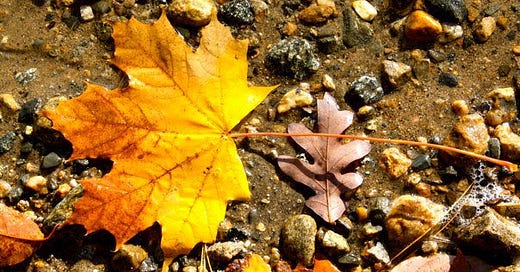



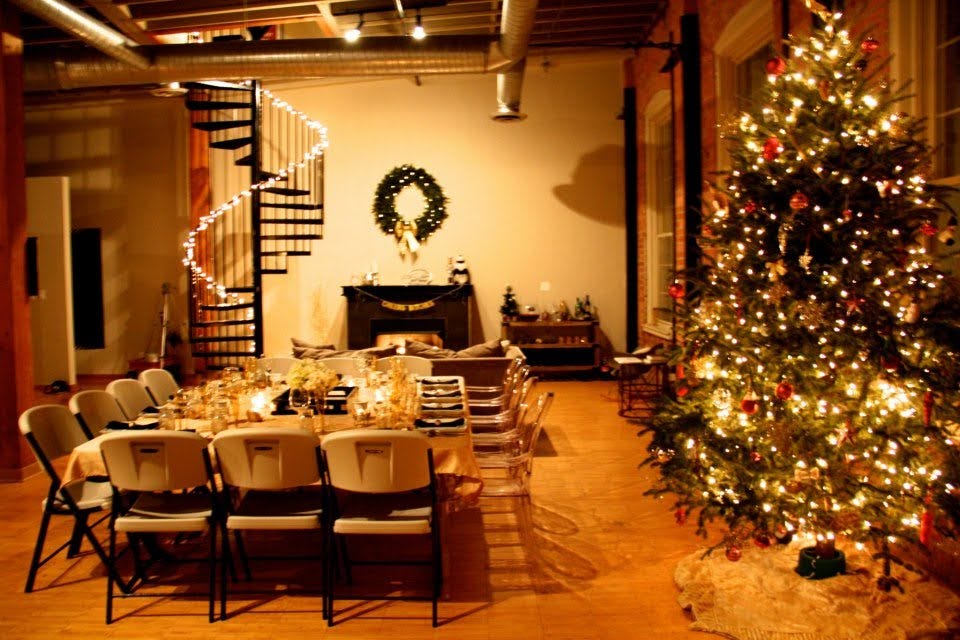
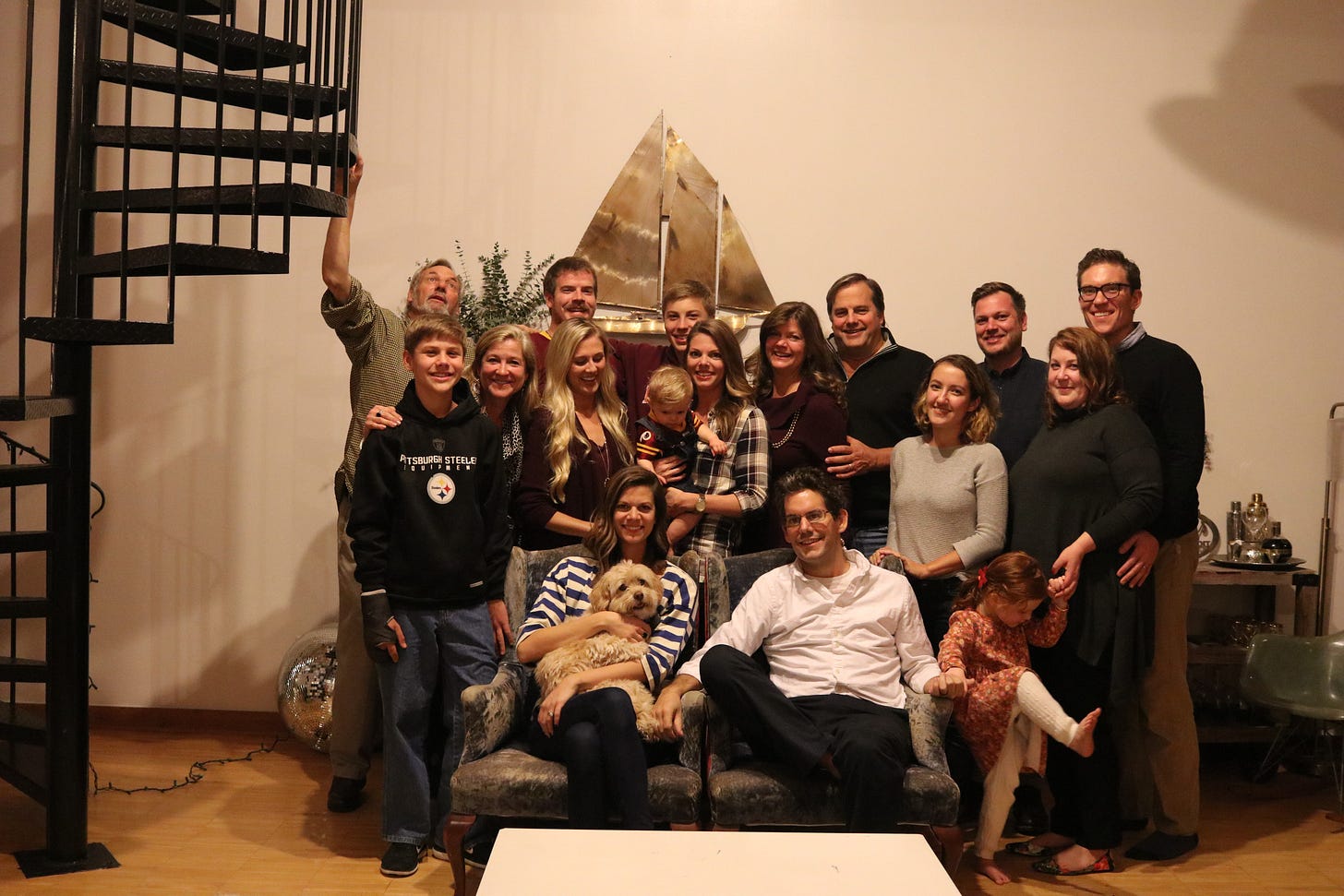
Beautiful my written. I am in year 3 and is so much about learning what to keep, let go of and make new.
thanks for sharing such important memories.